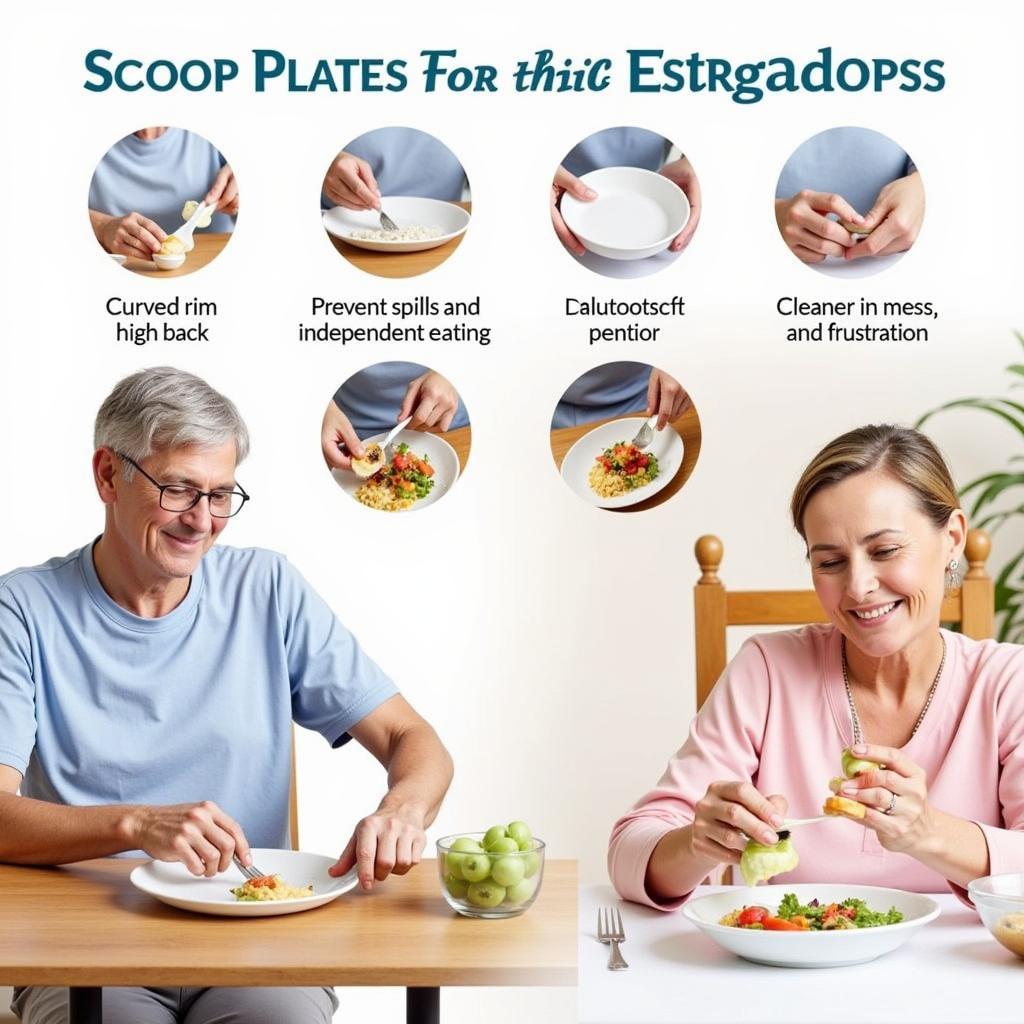Scoop Plates for Elderly: Enhancing Mealtime Independence and Dignity
Scoop plates for the elderly are specially designed dishware that can significantly improve mealtime independence and dignity for seniors, especially those experiencing physical limitations like arthritis, tremors, or weakened grip. These plates feature a curved inner rim and often a high back, making it easier to scoop food onto utensils without spilling. They are a simple yet effective solution that can greatly enhance the quality of life for older adults.
The Benefits of Scoop Plates for Seniors
Scoop plates offer a multitude of benefits for elderly individuals. They reduce food spillage, promoting cleaner mealtimes and less frustration. This is especially helpful for those with limited dexterity or coordination. Furthermore, these plates empower seniors to eat more independently, fostering a sense of dignity and self-reliance. The raised edges also prevent food from sliding off the plate, a common issue for those with tremors. The simple design can significantly improve the dining experience for seniors, making mealtimes more enjoyable and less stressful.
 Benefits of Scoop Plates for the Elderly
Benefits of Scoop Plates for the Elderly
Choosing the Right Scoop Plate: Materials and Features
When selecting a scoop plate for an elderly person, consider the material and specific features that best suit their needs. Plates are available in various materials, including plastic, melamine, and ceramic. Plastic and melamine are lightweight, durable, and often dishwasher-safe, making them practical choices. Ceramic options offer a more traditional feel but can be heavier and more prone to breakage. Some plates feature suction bases to prevent sliding, particularly helpful for individuals with limited upper body strength. Others have compartments for portion control or separating different food items. Handles and grips can further assist those with weakened grip strength.
Integrating Scoop Plates into Mealtimes
Introducing a scoop plate can be a positive change for an elderly individual. Start by explaining the benefits and how it can make mealtimes easier. Choose a plate that is aesthetically pleasing and comfortable to use. Encourage the senior to try it out and provide positive reinforcement. If the individual has cognitive impairment, a simple, consistent routine can be helpful. Patience and understanding are key to a successful transition. Remember that adapting to a new eating aid can take time.
“Introducing assistive devices like scoop plates should be done with sensitivity and respect for the individual’s preferences,” says Dr. Emily Carter, a geriatric occupational therapist. “It’s about empowering them to maintain their independence and dignity while enjoying their meals.”
How Scoop Plates Promote Dignity and Independence
Scoop plates are more than just practical dishware; they are tools that empower seniors to maintain their dignity and independence. By reducing the challenges associated with eating, these plates restore confidence and allow individuals to focus on enjoying their meals rather than struggling with utensils. This can have a profound impact on their overall well-being and quality of life. The ability to eat independently, even with physical limitations, is a crucial aspect of maintaining self-esteem and a positive self-image.
“The simple act of eating independently can significantly improve an elderly person’s emotional well-being,” adds Dr. Michael Davis, a certified geriatrician. “Scoop plates are a valuable tool in promoting a sense of control and self-sufficiency.”
Conclusion: Improving Mealtimes with Scoop Plates for the Elderly
Scoop plates for the elderly offer a simple yet impactful solution for improving mealtime independence and dignity. By reducing spillage, promoting self-reliance, and enhancing overall dining experience, these plates can significantly enhance the quality of life for seniors. Choosing the right scoop plate based on individual needs and preferences is crucial for a successful transition. Consider the various materials, features, and design options to find the perfect fit.
FAQ
- Are scoop plates dishwasher safe? Most plastic and melamine scoop plates are dishwasher safe, but check the manufacturer’s instructions.
- What is the best material for a scoop plate? The best material depends on individual needs and preferences. Plastic and melamine are lightweight and durable, while ceramic offers a more traditional feel.
- Can scoop plates be used for people with dementia? Yes, scoop plates can be beneficial for people with dementia, as they simplify the eating process and reduce frustration.
- Where can I purchase scoop plates? Scoop plates can be purchased online, in medical supply stores, and in some pharmacies.
- Are there different sizes of scoop plates available? Yes, scoop plates are available in various sizes to accommodate different needs and preferences.
- Do scoop plates help with tremors? Yes, the raised edges of scoop plates can help prevent food from sliding off, making them beneficial for individuals with tremors.
- Are scoop plates expensive? Scoop plates are generally affordable, with prices varying depending on the material and features.
Common Scoop Plate Scenarios
- Arthritis: Scoop plates make it easier for individuals with arthritis to scoop food onto their utensils, reducing strain on their joints.
- Tremors: The raised edges help prevent food from spilling due to tremors, promoting cleaner and more dignified mealtimes.
- Weak Grip: Handles and grips on some scoop plates provide extra support for those with weakened grip strength.
- Visual Impairment: The contrasting colors of some scoop plates can help individuals with visual impairments see their food more easily.
Further Resources
You may also be interested in our articles on adaptive cutlery and other assistive dining devices.
For assistance, please contact us at Phone Number: 0989060241, Email: [email protected] or visit our address: Lot 2, Hamlet 5, An Khuong, Hon Quan, Binh Phuoc, Vietnam. We have a 24/7 customer service team.
